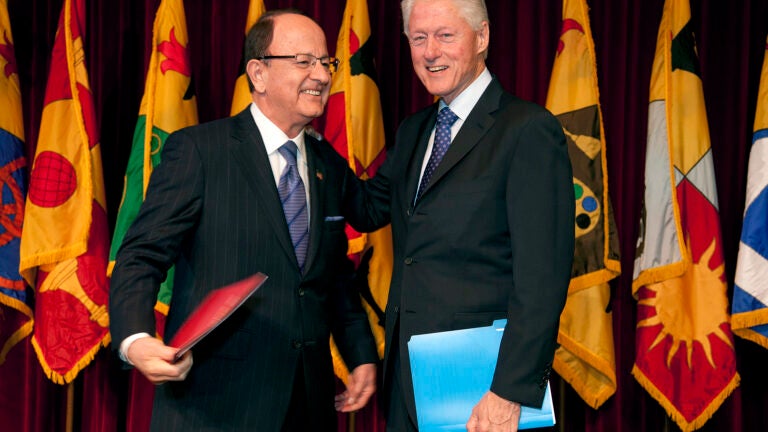
Bill Clinton takes the stage with USC President C. L. Max Nikias on Nov. 7. (USC Photo/Karen Ballard)
Bill Clinton speaks in Bovard Auditorium
The former chief executive addresses a capacity crowd as part of the USC President’s Distinguished Lecture series
USC was honored to host Bill Clinton, founder of the Clinton Foundation and 42nd president of the United States. ??The former chief executive addressed a capacity crowd of USC students, faculty and guests on Nov. 7 in Bovard Auditorium.
USC President C. L. Max Nikias introduced the famous son of Hope, Arkansas.
A long tradition
“Throughout his extraordinary life, President Clinton has sought to understand — and even befriend — the changes of our time,” Nikias said. “His presidency coincided with the close of the 20th century — a time of great technological, cultural and economic transformation. His foresight contributed to one of the most prosperous and peaceful times in our country’s history.”
In appearing at Bovard, Clinton continued a long tradition of USC campus visits by former or sitting presidents, including Barack Obama, George W. Bush, George H.W. Bush, Ronald Reagan and Gerald Ford. ??Clinton, who left office in 2001 with the highest end-of-term approval rating of any president since World War II, covered a wide range of topics, but his main theme was globalization.
“The fundamental reality of the world we’re living in, the world we’re moving toward, is interdependence. And it will only increase. Divorce is not an option,” Clinton said. “Therefore I believe the most important job of any citizen in the 21st century is to define the terms on which you would like to relate to your neighbors around the corner and around the world.”
Clinton described the inspiring nature of his work through the Clinton Foundation, which builds partnerships between businesses, governments, non-government organizations and individuals to improve global health and wellness, increase opportunity for women and girls, reduce childhood obesity and preventable diseases, create economic opportunity and growth, and help communities address the effects of climate change.
The next 20 years look good to me. I wish I were your age. I’d love to see what’s going to happen.
Bill Clinton
He spoke of the transformative power of digital technology in developing nations, such as Thailand, where cellphones have allowed fishermen to demand a fair price for their catch, and Haiti, where banking mobile apps for the first time have put credit within reach of 85 percent of the population.
??Looking toward the future
Clinton exuded optimism for the future.
“The next 20 years look good to me,” he said, speaking directly to the USC students in the audience. “I wish I were your age. I’d love to see what’s going to happen. We’re entering an age of unprecedented discovery…. It’s going to be an amazing time to be alive.”
In a follow-up conversation with James G. Ellis, dean of the USC Marshall School of Business, Clinton deployed his signature down-home eloquence to crystalize the best way to approach complex foreign policy issues.
“In international affairs,” he said, “when you see a problem, you have to ask yourself: Is this more like a toothache or a scab? If it’s a scab, you ought to leave it alone because it’ll work itself out, and if you scratch it, you’ll make it worse. However, if it’s a toothache, if you don’t deal with it pretty soon your whole mouth is aching.”
Clinton’s speech was presented as part of the USC President’s Distinguished Lecture series. Founded in 1996, the series brings highly respected men and women to campus to discuss significant issues of the day. Speakers in the series have included George Mitchell, Margaret Thatcher, Shimon Peres, Henry Kissinger, Colin Powell, Madeleine Albright, Vicente Fox, Henrique Cardoso, Lech Walesa, Tom Brokaw and Robert Gates.



